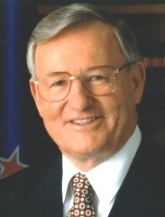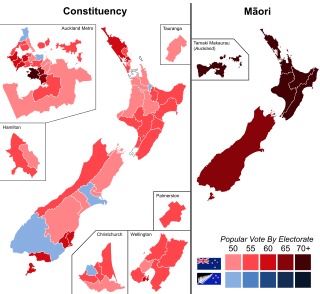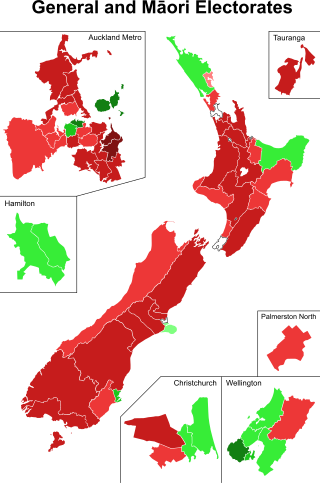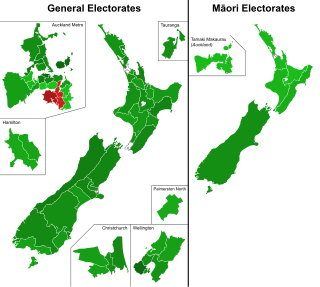
A referendum is a direct vote by the electorate on a proposal, law, or political issue. This is in contrast to an issue being voted on by a representative. This may result in the adoption of a new policy or specific law, or the referendum may be only advisory. In some countries, it is synonymous with and also known as plebiscite, votation, popular consultation, ballot question, ballot measure, or proposition.

Electoral reform in New Zealand has been a political issue in the past as major changes have been made to both parliamentary and local government electoral systems.

New Zealand is a representative democracy in which members of the unicameral New Zealand Parliament gain their seats through elections. General elections are usually held every three years; they may be held at an earlier date at the discretion of the prime minister, but that usually only happens in the event of a vote of no confidence or other exceptional circumstances. A by-election is held to fill an electorate vacancy arising during a parliamentary term. The most recent general election took place on 14 October 2023.

The 1993 New Zealand general election was held on 6 November 1993 to determine the composition of the 44th New Zealand Parliament. Voters elected 99 members to the House of Representatives, up from 97 members at the 1990 election. The election was held concurrently with an electoral reform referendum to replace the first-past-the-post system, with all members elected from single-member electorates, with mixed-member proportional representation. It saw the governing National Party, led by Jim Bolger, win a second term in office, despite a major swing away from National in both seats and votes, and the carrying of the referendum by 53.9% to 46.1%.

The six o'clock swill was an Australian and New Zealand slang term for the last-minute rush to buy drinks at a hotel bar before it closed. During a large part of the 20th century, most Australian and New Zealand hotels shut their public bars at 6 pm. A culture of heavy drinking developed during the time between finishing work at 5 pm and the mandatory closing time only an hour later.

The Royal Commission on the Electoral System was formed in New Zealand in 1985 and reported in 1986. The decision to form the Royal Commission was taken by the Fourth Labour government, after the Labour Party had received more votes, yet it won fewer seats than the National Party in both the 1978 and 1981 elections. It was also a reaction to the power displayed by Prime Minister Robert Muldoon, whose action of illegally abolishing the Superannuation scheme in 1975 without any repercussions highlighted the need to distribute power in a more democratic way. The Royal Commission's report Towards a Better Democracy was instrumental in effecting New Zealand to change its electoral system from first-past-the-post to mixed member proportional.

The New Zealand electoral system has been mixed-member proportional (MMP) since the 1996 election. MMP was introduced following a referendum in 1993. It replaced the first-past-the-post (FPP) system New Zealand had previously used for most of its history. Under MMP, New Zealanders have two secret ballot votes to elect members of Parliament (MPs). The first vote is for a candidate from an electorate, a geographic electoral district. The second is the party vote for the political party the voter wants to form the government.

Referendums are held only occasionally by the Government of New Zealand. Referendums may be government-initiated or held in accordance with the Electoral Act 1993 or the Citizens Initiated Referenda Act 1993. Nineteen referendums have been held so far ; fourteen were government-led, and five were indicative citizen initiatives.

The 2009 New Zealand Referendum on Child Discipline was held from 31 July to 21 August, and was a citizens-initiated referendum on parental corporal punishment. It asked:
Should a smack as part of good parental correction be a criminal offence in New Zealand?
The 2011 New Zealand voting system referendum was a referendum on whether to keep the existing mixed member proportional (MMP) voting system, or to change to another voting system, for electing Members of Parliament to New Zealand's House of Representatives. It was held on 26 November 2011 in conjunction with the 2011 general election.
The first Citizens Initiated Referendum was held in New Zealand on 2 December 1995, based on the question:
Should the number of professional firefighters employed full time in the New Zealand Fire Service be reduced below the number employed on 1 January 1995?

A referendum on gambling was held in New Zealand on 9 March 1949. Voters were asked whether off-course betting on horse races should be allowed. It was approved, with 68% in favour. Voter turnout was 54%. The referendum was held in conjunction with the 1949 New Zealand licensing hours referendum.

A referendum on the length of the term of Parliament was held in New Zealand on 23 September 1967. Voters were asked whether they approved of extending the term from three to four years. The change was rejected by 68.1% of voters, with a turnout of 69.7%.

The 1999 New Zealand MP reduction referendum was held during the 1999 general election on 27 November 1999. The Referendum considered two questions, in which one brought upon the question on whether New Zealand Parliament should be restructured - reducing the number of MPs from 120 to 99 members in the House of Representatives.

A referendum on the hours for the sale of liquor in hotel bars was held in New Zealand on 9 March 1949. Voters were asked whether they favoured continuing the closing of hotel bars at 6 pm or extending the closing time to 10 pm. The change was rejected by 75.5% of voters.

A referendum on the hours for the sale of liquor in hotel bars was held in New Zealand on 23 September 1967. Voters were asked whether they favoured continuing the closing of hotel bars at 6 pm or later closing, the actual hours of sale to be decided according to local conditions. The change was favoured by 64.5% of voters.

The 2013 New Zealand asset sales referendum is a citizens-initiated referendum that took place by postal ballot from 22 November 2013 to 13 December 2013. It was on the Fifth National (Key) government's policy to partially privatise four energy-related state-owned enterprises and reducing the government's share in Air New Zealand.

Two referendums were held by the New Zealand Government in November/December 2015 and March 2016 to determine the nation's flag. The voting resulted in the retention of the current flag of New Zealand.

The 2020 New Zealand cannabis referendum was a non-binding referendum held on 17 October 2020 in conjunction with the 2020 general election and a euthanasia referendum, on the question of whether to legalise the sale, use, possession and production of recreational cannabis. It was rejected by New Zealand voters. The form of the referendum was a vote for or against the proposed "Cannabis Legalisation and Control Bill". Official results were released by the Electoral Commission on 6 November 2020 with 50.7% of voters opposing the legalisation and 48.4% in support.

The 2020 New Zealand euthanasia referendum was a binding referendum held in New Zealand on 17 October 2020, on the question of whether to legalise euthanasia via the End of Life Choice Act 2019. The vote was held in conjunction with the 2020 general election, and official results were released on 6 November 2020. It was accepted by New Zealand voters, with 65.1% in support and 33.7% opposed.








